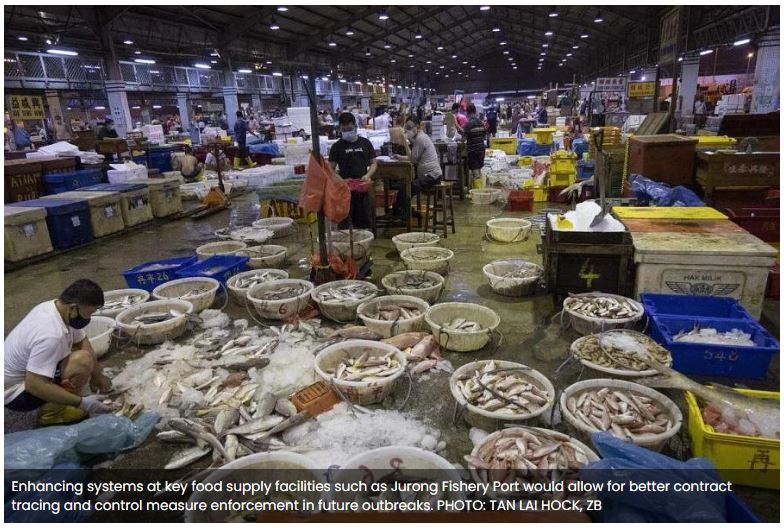Singapore to strengthen food distribution facilities, infrastructure for future crises
SINGAPORE is strengthening the resilience of key food distribution facilities against future emergencies and pandemics, Senior Minister of State for Manpower and Defence Zaqy Mohamad said in Parliament on Tuesday (Mar 21).
The Singapore Food Agency is upgrading key food supply facilities, such as Jurong Fishery Port and Pasir Panjang Wholesale Centre, to improve security, surveillance and access control systems.
“This would allow for better contact tracing in the event of a future disease outbreak and support the enforcement of control measures,” said Zaqy, during the second day of debate on a White Paper on the government’s handling of Covid-19.
Companies should continue to review business continuity plans and keep them relevant, to ensure supply resilience at the company level, he added.
Singapore is also improving the adaptability and resilience of its infrastructure, after facing overwhelming demand for quarantine and temporary accommodation during Covid-19, said Zaqy. Public-sector agencies are working to identify facilities that can be used in crises, and preparing sites to be used in emergencies.
This includes developing dual-use facilities that have both peacetime and crises functions, for instance by retrofitting existing state properties.
He cited the example of the Sengkang West Quick-Built Dormitory, now used for residential onboarding and medical examinations of new migrant workers arriving in Singapore. “In the event of a pandemic, the Onboard Centre can be quickly converted into a dedicated facility for newly arrived workers to serve their stay-home notice,” he said.
Public-sector agencies will engage the owners of private infrastructure to explore the use of sites such as chalets, hotels, serviced apartments and exhibition spaces for emergency housing. D’Resort@Downtown East, for example, was used as a government quarantine facility during the pandemic.
The minister also addressed labour-related issues that Members of Parliament raised in the debate, such as the need for workforce vaccination measures.
He noted that these measures were introduced when the virus was mutating, with highly transmissible new variants emerging. The measures were necessary because unvaccinated individuals could have been infected at the workplace and been at risk of severe illness, putting more strain on the healthcare system, he said.
Separately, one key lesson from the pandemic is to ensure economic resilience by developing a strong Singapore core, complemented by a diverse foreign workforce, said Zaqy. He noted that pandemic-era border restrictions caused foreign worker numbers to fall from about 1.4 million in December 2019 to about 1.2 million in December 2021 – though they have since recovered to pre-Covid levels.
“By combining and complementing local and foreign expertise, we can grow the overall pie for Singapore and provide more good job opportunities for all.”
Another area where Singapore must build resilience is the built environment sector, the minister said. He recounted how the hard-hit sector received financial, legal and logistical support from the government and trade associations, as well as how migrant workers’ accommodation and well-being were looked after.
Other aspects of resilience highlighted were the Singapore Armed Forces’ high levels of operational readiness, and how the Malay/Muslim community adjusted to pandemic curbs on religious life.
Source: https://www.businesstimes.com.sg/singapore/singapore-strengthen-food-distribution-facilities-infrastructure-future-crises


 Thailand
Thailand




